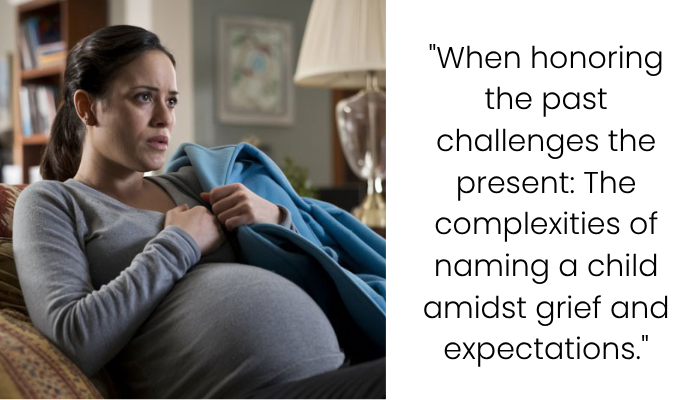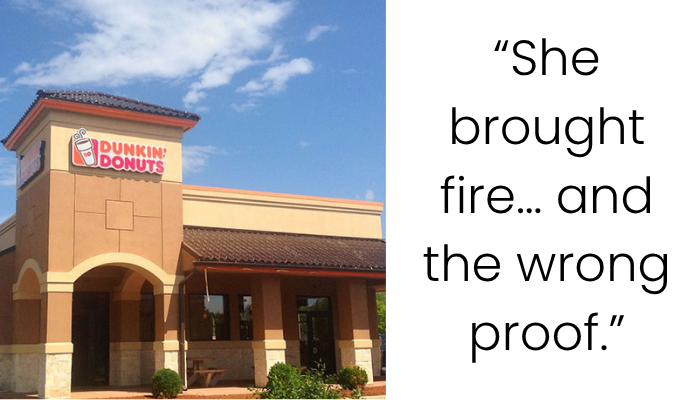Naming Boundaries: When Honoring the Past Clashes with Personal Choice

In the delicate realm of family dynamics, naming a child often becomes a focal point of emotional significance and personal boundaries. A pregnant woman, 29 weeks along, finds herself at the center of such a conflict. Her father’s wife, grieving the recent loss of her own mother, has requested that the unborn child be named in her memory. Despite the couple having already chosen a name, the request was made during a family visit and reiterated before departure. The expectant mother, valuing her autonomy and personal history, firmly declined, leading to tension and a strained relationship.
Advertisement – Continue Reading Below
This situation underscores the complexities that arise when personal choices intersect with familial expectations, especially during emotionally charged times. It raises questions about the extent to which individuals should accommodate others’ grief in their personal decisions and the importance of setting boundaries to maintain one’s sense of self and family unit.
Pushy people don’t just ignore your words and needs, but they also disregard your right to make your own decisions

It was the first time the author had seen her father and stepmother ever since the stepmother lost her mom













Navigating the Emotional Terrain of Naming a Child Amidst Grief and Family Expectations
Advertisement – Continue Reading Below
The decision to name a child is deeply personal, often reflecting a tapestry of cultural traditions, familial bonds, and individual preferences. In the scenario presented, the expectant mother faces a poignant dilemma: her father’s wife, grieving the recent loss of her own mother, earnestly requests that the forthcoming child be named in her memory. This request, while rooted in sorrow and a desire for remembrance, intersects with the mother’s autonomy and her and her husband’s vision for their child’s identity.

The Cultural and Emotional Significance of Naming After the Deceased
Naming a child after a deceased loved one is a practice steeped in tradition across various cultures. In Ashkenazi Jewish customs, for instance, it’s customary to name a child after a departed relative, serving as a tribute and a means to perpetuate the loved one’s legacy. Similarly, in certain African cultures, names like “Babatunde” or “Yetunde” signify the belief in ancestral reincarnation, symbolizing the return of a forebear through the newborn.
Advertisement – Continue Reading Below
However, these practices are not universally embraced. In some cultures, reusing the name of a deceased individual is considered taboo, believed to invite misfortune or hinder the deceased’s journey in the afterlife. The concept of a “necronym”—the posthumous use of a person’s name—highlights the complexities surrounding this practice. While it can serve as a heartfelt homage, it may also impose unintended psychological burdens on the child, who might grapple with living up to the legacy of their namesake.
Psychological Implications for the Child
Assigning a child the name of a deceased relative can inadvertently place emotional expectations upon them. Studies have indicated that children named after deceased siblings or relatives may experience identity confusion or feel compelled to emulate the life of someone they never knew. This phenomenon, sometimes referred to as the “ghost child” syndrome, underscores the importance of allowing a child to forge their own identity, free from the shadows of the past.
Advertisement – Continue Reading Below
Moreover, the child might sense the weight of their name as a constant reminder of familial grief, potentially affecting their self-esteem and emotional well-being. It’s crucial for parents to consider these implications, ensuring that their naming choices foster a nurturing environment for the child’s individual growth.
Balancing Grief with Autonomy
The father’s wife’s request emerges from a place of profound grief. The loss of a parent is a seismic event, often leaving individuals seeking tangible ways to keep their loved one’s memory alive. In this context, naming the child after her mother represents a beacon of continuity and remembrance.
Advertisement – Continue Reading Below

Yet, the expectant mother and her husband have their own aspirations and visions for their child’s name—choices that resonate with their shared experiences, values, and hopes for the future. Their decision to select a name independent of familial expectations is a valid assertion of their autonomy as parents.
Navigating Familial Expectations and Setting Boundaries
Family dynamics can become particularly intricate when personal choices intersect with collective grief. The father’s wife’s repeated appeals, while emotionally charged, may inadvertently cross boundaries, placing undue pressure on the expectant parents.
Advertisement – Continue Reading Below
It’s essential for families to engage in open, empathetic dialogues, acknowledging each other’s feelings while respecting individual choices. Setting clear boundaries, as the expectant mother did, is a healthy practice to prevent resentment and preserve familial relationships.
Netizens believe she did nothing wrong and criticized her father for trying to keep the peace rather than holding his wife accountable






Conclusion: Honoring Memories While Embracing New Beginnings
The journey of naming a child is a delicate balance between honoring the past and embracing the future. While it’s natural for family members to desire a continuation of legacy through names, it’s equally important to respect the parents’ prerogative to choose a name that aligns with their vision for their child’s identity.
Advertisement – Continue Reading Below
In this scenario, the expectant mother’s decision to decline the request, albeit firmly, reflects a thoughtful consideration of her child’s individuality and her family’s values. While the conversation may have been difficult, it underscores the importance of clear communication and mutual respect in navigating the complex interplay of grief, tradition, and personal choice.






